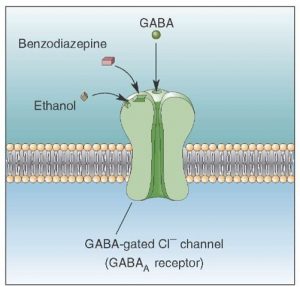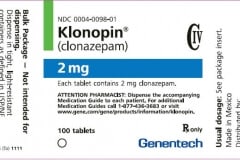In this article, we’re going to discuss how to use Clonazepam for alcohol withdrawal. The process of quitting drinking can be made much easier by taking a benzodiazepine for withdrawal symptoms.

As drinking increases over time, withdrawal symptoms can progress from mild to psychologically exhausting and even dangerous. Many people avoid discussing their true levels of alcohol consumption with their doctors. As a result, they do not find out about the proper use of benzodiazepines for withdrawal. Binging, abstinence, and relapse can form a vicious cycle that continues for many years.
It’s important to understand that withdrawal is not all in your head. Symptoms like rapid heart beat, panic attacks, or a profound sense of impending doom can get worse and lead to fatal seizures. Withdrawal symptoms become more severe with repeated episodes because of a phenomenon known as kindling.
In a medical detox environment, it’s common to receive benzodiazepines for withdrawal. A patient may be given an initial injection followed by 1-2 weeks of tapered oral doses that are carefully monitored.

Overview
Clonazepam is in a family of anti-anxiety drugs called benzodiazepines. Clonazepam is generic and it is most commonly sold under the brand name Klonopin. Other benzodiazepine brands include Librium, Valium, Ativan, and Xanax.
All of these drugs can be effective for withdrawal symptoms because they reduce anxiety, prevent convulsions, and help with sleep. Because they vary in terms of strength and their length of effects, doctors choose between them depending on the patient’s symptoms.
Clonazepam is effective at alleviating or preventing the following symptoms:
- Anxiety
- Insomnia
- Nausea
- Headache
- Restlessness
- Panic attacks
- Tremors
- High blood pressure
- Delirium Tremens
Benzodiazepines work by activating GABA receptors in the brain, which are also stimulated by alcohol. GABA is an inhibitory neurotransmitter associated with feelings of calm. Intoxication causes a spike in GABA and withdrawal involves a plunge in GABA. Many withdrawal symptoms (including panic and even seizures) are caused by insufficient levels of GABA in the brain.

Using this medication can provide temporary peace of mind and prevent severe symptoms from manifesting. Because of its effectiveness, hospitals often prescribe this drug to alcoholics and then gradually reduce the dose to taper them off of it.
Here are some things to consider before obtaining a prescription:
- Because everyone is biochemically different, another benzodiazepine may work better for you.
- Depending on the severity of your addiction, your doctor may recommend inpatient detox or prescribe you this medication that you can taper off while you quit drinking at home. If you quit drinking at home, make sure you have support and that you repair your body proactively.
- All benzodiazepines can be addictive, which is why they should only be used for a short period of time and in the lowest effective dose.
- All benzodiazepines can cause overdose if too much is taken at once. Mixing these drugs with alcohol can be very dangerous and lead to blackouts.
- Even if you take this, you will still need to repair nutrient deficiencies caused by excessive drinking. You may also have other symptoms such as low motivation and depression that benzodiazepines cannot resolve.
- Using this medication is a great strategy for the short term, but in the longer term, it’s important to have external support and to renew your sense of purpose in life.
How To Take Clonazepam
Here are some things to consider:
- Only take with a prescription and under the supervision of a doctor.
- Tablets are typically 0.125, 0.25, 0.5, 1 mg or 2 mg.
- Doses can be divided throughout the day, but Clonazepam is a long-acting benzodiazepine so only one dose may be needed.
- There is no standard dosage; a doctor can determine this depending on your situation.
- Most people do not need to take it for more than a few days or a week.
- To avoid dependence, do not use this medication for longer than you need it.
Further Considerations
By preventing complications caused by low levels of GABA in the brain, using Clonazepam can help you have a much safer and more pleasant detox. Even if your symptoms aren’t severe, envisioning life without alcohol is hard enough. Nervous exhaustion and insomnia can make the task of quitting drinking seem nearly impossible.
But while it can help with quitting, it is not a cure-all for the physical damage caused by alcoholism. Many people who use benzodiazepines end up relapsing because they feel tortured by depression or cravings after their taper ends. These other symptoms are often caused by the following problems that are NOT resolved by benzodiazepines:
- Low dopamine
- Low serotonin
- Magnesium deficiency (my life changed when I began taking magnesium!)
- B-vitamin deficiencies
- Other vitamin and mineral deficiencies
- Poor liver health
Fortunately, there is a way to address all of these problems at once. Check Fit Recovery’s list of supplements that work best for supporting the brain-body system through recovery.
Another trick is to take glutamine to resolve sudden, intense bouts of cravings. Try it and you’ll see that it works. Glutamine is an amino acid that can help to repair every cell in your body.
The bottom line is that using Clonazepam for alcohol withdrawal can be very effective, but it’s just the first part of a long process. Give your body what it needs during this time, and your mind will be sure to follow!

Conclusion
We hope you’ve enjoyed this article. Subscribe to our email list to stay posted on future articles that can help you down the road.
If you have any questions, please leave them in the comment box below.
___________________________________

Dr. Ken Starr is board-certified in both Addiction Medicine and Emergency Medicine, and is a diplomate of the American Board of Addiction Medicine. In addition to his work as the Addiction Medicine Director for Fit Recovery, he operates Ken Starr MD Wellness Group in Arroyo Grande, CA. His clinic offers advanced drug and alcohol detox methods, long-term recovery facilitation, and IV nutritional programs including NAD+ therapy.







